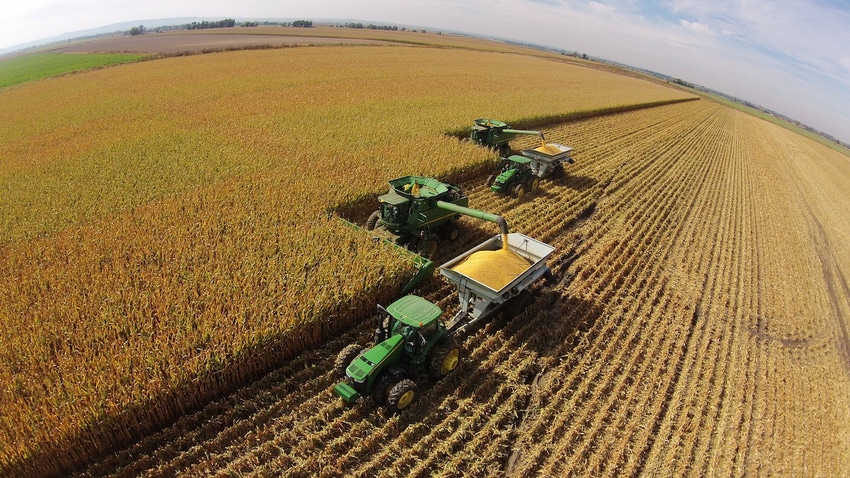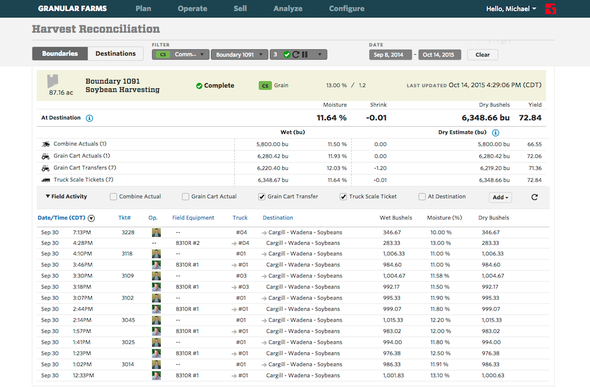November 13, 2015

As precision ag technology and more complex farming operations have generated ever-larger amounts of data, systems to track and use it to make better decisions have lagged behind.
For Jeana Harms, chief record-keeper and financial officer for Hoehn Farms, Gering, Neb., that’s meant starting each day during harvest making the rounds of the farm’s fleet of grain trucks collecting elevator tickets. After returning to the office, she or a member of the staff would enter ticket data into one of many spreadsheets used to track farm business operations.
In 2015, the contrast couldn’t be greater. Now she’s able to review elevator tickets in near real time, thanks to the farm’s truck drivers, who capture the ticket data on smartphones while still at the elevator, then upload it for immediate viewing in the office.
More important, hours spent entering elevator tickets into spreadsheets are a thing of the past. So, too are lost elevator tickets and other challenges of keeping track of the farm’s five major crops, which include corn, soybeans, wheat, dry edible beans and sugar beets.
Downloads from equipment
“The cloud-based software we are now using is a huge time-saver,” says Harms, who began using Granular, a new farm management service, in 2015. “It automatically downloads data from our planter and sprayer monitors and hopefully soon, it will integrate and download from combine monitors, too. It saves a lot of phone calls and back and forth keeping track of what we are doing.”
The service automatically captures application and irrigation data through Hoehn Farms’ MyJohnDeere and AgSense irrigation monitoring accounts and downloads it into field records. The service also enables farm workers to record and upload field activities as they are completed using a smartphone app.
In the past, Harms used 30 or more spreadsheets to keep track of the farm’s operations, which include owned and rented ground farmed in various partnerships, as well as a cattle-feeding operation. Along with being cumbersome, the system limited data access to a few computers. Their Granular data resides on remote server computers, so it can be accessed from any secure internet-connected computer, which is especially valuable given the operation’s multiple locations.
Granular also has logistics and planning capabilities, both of which Hoehn Farms is gradually building into its management systems.
“We use it for a lot more than recordkeeping,” Harms says. “We use it to plan workflow. Every day I can see everything that was done the day before. We can look at profitability by crop or field throughout the season. For developing the 2016 crop budgets, we will know exactly how much of each input we will need.”
Data mining revolution
Cloud-based services like Granular are ushering in a new farm management era when precision ag and other data will automatically flow into reports, where the improved accessibility can quickly inform decision-making and mine it for value, says Tom Kahl, Granular vice president of sales and customer success.
Granular, a two-year-old Silicon Valley start-up, has attracted $25 million in venture capital from the likes of Google Ventures and Tao Capital Partners. Its goal is to become an independent publicly traded company without conflicts of interest surrounding the data it warehouses for farmers, he says.
Granular includes planning, analysis and budgeting functions, plus logistics management features that assign and track work tasks and assess field workability and crop development based on field-by-field weather.

“What we offer today is about 30 percent of the end game as we continue to build out functionality,” says Kahl.
For 2016, the service will be able to automatically download as-applied data from most precision monitors, including those from Trimble, Case, Precision Planting, as well as John Deere, which it already handles.
Since starting with a beta test with 10 farmers in 2014, it has grown to include about 100 customers who collectively farm almost 1 million acres across the U.S. and western Canada. Its primary focus is to serve larger operations that can benefit the most from its tracking, analysis and logistics capabilities, Kahl says. The starting cost is $15,000 annually, with the price calculated based on the mix of crops and total acreage.
Valued service
Harms says the $2.40/acre cost of the service to Hoehn Farms has been well worth it. “We are saving that amount in time, preventing billing mistakes and making better management decisions based on better information,” she says. “Having all our cropping information in one spot is a huge value as far as planning. I have shown this to our banker and he absolutely loves it.”
She’s looking forward to the day when Granular will be integrated with their PC-based QuickBooks accounting system, which will save more time. That capability is expected to be in place in 2016-17 as QuickBooks becomes primarily a cloud-based program, says Kahl. Harms is also hoping Granular will eventually add a livestock component, although Kahl says the company’s focus will remain on crops for now.
About the Author(s)
You May Also Like






